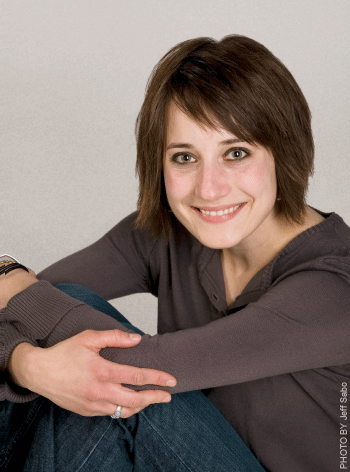
 A gerontology student lives in nursing homes all summer, searching to understand a patient’s perspective. A gerontology student lives in nursing homes all summer, searching to understand a patient’s perspective.
by Denise Spranger
In 2067, Molly Trauten will be 85 years old. Yet somehow, the gerontology student couldn’t wait that long to experience the reality of a nursing home. So last summer, she sustained herself on thickened liquids and puréed foods, slept with an oxygen tube in her nose, and ambled behind a walker. By slowing her step, she hoped to gain a clearer view of life from a nursing home patient’s perspective.
Trauten’s 12-week practicum as a full-time nursing home resident became the subject of her thesis for a master’s degree in gerontology at Miami University. Inspired by a background in anthropology, she resolved to deepen the scope of her work through “ethnographic immersion.”
In February 2006, she contacted Marilyn Gugliucci, director of geriatric education and research at the University of New England. Gugliucci, who had placed a medical student in a nursing home for a two-week immersion the previous summer, arranged stays for Trauten at three Maine facilities.
Although her role at each home was fully disclosed, she received a “mock diagnosis” common to that of an 85-year-old woman: congestive heart failure and chronic obstructive pulmonary disease. Initially, her “condition” prevented her from leaving her room unassisted.
She thought she had grown comfortable in nursing facilities as a child while visiting her grandmother in a dementia unit.
Even so, with so many hours of free time and no purpose, she soon faced the nemesis of life in a nursing home: depression. Though she reminded herself that her stay was voluntary — and temporary — the loss of independence dampened her spirit. Endless loud noises day and night prevented sleep. Meals and the start of a new shift of employees were her few highlights.
She poured these observations into a daily journal that became the field notes for her research. Those notes reveal an evolution in her perspective.
“When I started to just be, just let myself feel more and show my emotions, there was a turning point. In reading my notes, I noticed how even my language changed. I started out saying ‘the residents’ or ‘they.’ At the end I say ‘we.’ ”
She settled into the rhythms of the culture, joining activities and sharing meals, and became a regular in the common areas, playing hours and hours of bingo.
“At first I wished that we could have deeper conversation — not just talk about the weather, what we’ve had to eat, how we’ve slept. But as I’ve had time to think about this, though it seemed superficial, it wasn’t. It was the connection of people sharing a certain time and place.”
Trauten’s eyes brighten as she recalls one of those connections.
“I had a roommate for a short while. She was fantastic. She was 90 years old and had worked the late shift all of her life — so she was up all night. She sang a lot and sometimes she would pull the curtain aside just to say ‘Hi.’ ”
As summer ended, Trauten struggled to re-engage her identity as a healthy 25-year-old graduate student. She admits that while the transition was difficult, even heartbreaking, she determined that what she learned would inform her own life’s work.
“All summer I heard staff say, ‘I take care of people the way that I would want my mother or my grandmother to be cared for.’ But I didn’t hear anybody say, ‘This is how I would want to be cared for.’ ”
The distinction Trauten makes is a significant one — as today’s attitudes toward long-term care impact the not-too-distant future of the largest generation in history. According to a recent report released by Miami’s Scripps Gerontology Center, which now offers a doctoral program in gerontology, the number of seniors likely to need that care will more than double between now and 2035. Although programs such as PASSPORT allow more seniors to benefit from in-home services, the insights of students such as Trauten may determine the quality of later life for generations, including their own.
“There are all kinds of popular notions about what it means to be old, about when we get ‘old’ and above all, how to stop getting old,” she says with a smile. “But what I found was that age didn’t matter. It was what I wasn’t expecting that was wonderful to recognize — our similarities, our common ground.”
Denise Spranger is a freelance writer based in Oxford, Ohio.
 Back to the Miamian Magazine Summer 2007 Web page Back to the Miamian Magazine Summer 2007 Web page
|